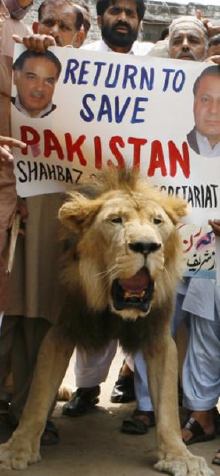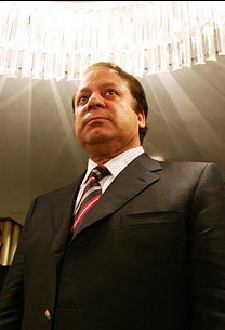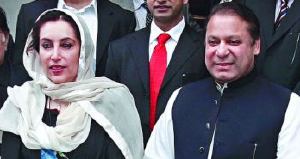 Adil Najam
Adil Najam
Former Prime Minister and PML(N) leader Nawaz Sharif is back in Pakistan.
Reportedly he landed in Lahore to a large reception by his supporters and was escorted to a special bullet proof car that had been brought for him. According to The News:
A special plane carrying the PML-N Chief Nawaz Sharif, his brother Shahbaz Sharif and other family members arrived in Lahore from the holy city of Madina on Sunday evening. The convoys of PML-N workers arrived in Lahore to accord rousing welcome to Sharifs. Large welcome banners and pictures of Sharif brothers have been displayed at several places in Lahore. The special plane Boeing777 carried Nawaz Sharif and Shahbaz Sharif along with 26 members of their family from the holy city of Madina.
The central and provincial leaders of PML-N, lawyers and members of civil society have arrived to receive Sharifs at Lahore Airport. Nawaz Sharif is expected to first visit Data Darbar in a procession and address a public meeting. Security had been tightened in Lahore especially on the airport ahead of arrival of the PML-N leader. Provincial home department has allowed only hundred party leaders to receive Sharifs at the airport, party sources claimed.
According to sources, bullet-proof cars for Sharifs reached in Lahore last night from Saudi Arabia. Meanwhile, the home department said that the authorities have decided to give free hand to Nawaz Sharif but he has not been permitted for holding a public meeting and rally.
Nawaz Sharif, Shahbaz Sharif and other family members will be transported to home from the airport, a home department statement said. However, thousands of PML-N workers succeeded in arriving airport by crossing the barricades put up by police. On this occasion, the workers raised slogans both in favour of Nawaz Sharif and against the government.
 Readers would remember from our prior posts that in August the Supreme Court of Pakistan had ruled that he could, in fact, return to Pakistan despite whatever ‘deal’ he had made with Gen. Musharraf at teh time of his original flight to Saudi Arabia. However, when he did return to the country in September, he was unceremoniously and dramatically deported back to Saudi Arabia with theatrics which rivaled his own attempts not to let Gen. Musharraf land in Pakistan many moons ago.
Readers would remember from our prior posts that in August the Supreme Court of Pakistan had ruled that he could, in fact, return to Pakistan despite whatever ‘deal’ he had made with Gen. Musharraf at teh time of his original flight to Saudi Arabia. However, when he did return to the country in September, he was unceremoniously and dramatically deported back to Saudi Arabia with theatrics which rivaled his own attempts not to let Gen. Musharraf land in Pakistan many moons ago.
Now it turns out that he has made yet another ‘deal’ with Gen. Musharraf which has enabled his return.
It is not fully clear what the ‘terms’ of this deal are. Nor what the Musharraf-Nawaz Sharif deal mean s for the earlier Musharraf-Benazir deal that had enabled her return some weeks back. Nor, in fact, is it clear what what his return (and the fact that now both Benazir and Nawaz Sharif are back in Pakistan) will mean for the future of Pakistan’s politics and the (supposed) forthcoming elections.
s for the earlier Musharraf-Benazir deal that had enabled her return some weeks back. Nor, in fact, is it clear what what his return (and the fact that now both Benazir and Nawaz Sharif are back in Pakistan) will mean for the future of Pakistan’s politics and the (supposed) forthcoming elections.
In despair, one even wonders if it means anything at all? Or is this just one more drama in the string of topi dramas that have come to define our distraught and fractured polity?



















































Dear Aqil Sahab:
I fully agree with you that in the current scenario NS is the best person who can bring the religious extreme to the centre, as he himself is centre to right. PPPP is much less comfortable sitting with the rightist elements. NS on the other hand can talk with both the rightists as well as the centrists. But astonishingly he also have-had alliances with the left such as the ANP. One thing about NS that I really like is that he has shown the ability to take people along even belonging to totally diverse group of people. For now he is our best hope.
Aqil Sajjad:
Feeding the large population as a prelude to disaster was first propounded by Malthus in the 18th century and he had predicted then the “current” rise in population would overwhelm natural resources and the population would die of hunger. That was mainly related to Britain. But his prediction never bore out for many reasons. One being the growth in agricultural products was more than population growth so in the end Britain had more food per person.
Why it won’t be a problem in the future?
1) World’s population is going to stall at around 9 billion by the most conservative estimates, it might even settle at less.
2) By some estimates the absolute increase in world population would start decreasing from 2009.
3) Advancements in technology would increase per acre yields as they have been doing since the start of the industrial revolution.
So in my view the problem of food shortages would not arise.
No matter whether Japan is too developed or China is under-developed, they still can be compared on certain points, though not all.
As for poverty, I would say it would be greatly tackled once people have migrated to urban areas from rural areas. Since in the urban areas the avergae income levels and average standard of living is far higher than in rural areas. Much has to do with higher house prices in urban areas that makes people spend more and hence contribute to the overall consumption levels and growth of the economies. Secondly, their spending is offset by the earning opportunities they enjoy in big cities, which are far more than in rural areas and also the pays are better. Also poverty would automatically start reducing once the population growth rate starts receding. But my contention is that government should not play any part in reducing it. Because, it would automatically go down with the passage of time, and it already is, for various reasons. Secondly, its better to have large populations for development than smaller ones, because its easier and more possible to build economies of scale if the population is high than its low.
One example is the USA. Apart from other reasons, one reason for its extra-ordinary development in the 20th century was its huge population governed by the same political and economic systems. That provided the economies of scale that Germany or Britain could only dream of. Even by the turn of the 20th century USA had a population of around 100 million. That gave a huge boost to its car industry, which played a great part in its development. In fact Henry Ford once famously remarked, “What is good for Ford is good for America”. The USA was able to develop the aircraft industry because it was, and still is, the largest aircraft market in the world.
If you do not have the ready market for your products, you can’t just develop that easily. That is exactly what is helping China. It has been so easy for it to develop such a huge manufacturing capacity because the manufacturers have a huge ready market for all the manufactured products. Thus China is able to achieve economies of scale unmatched by any other country. India has been so successful because it has achieved economies of scale in the software. Once again thanks to its size. So size does matter.
On the extremism front, I think NS is in a better position to take the right wing part of the population along because he enjoys their trust much more than Benazir.
If he avoids restarting the project of “becoming ameer-ul-momineen” and banning pop music on PTV because the long haired singers saying dil dil jaan jaan annoy him, he could also make himself somewhat acceptable to the center left.
I think we need someone like him who can convince the people of Pakistan that confronting extremism is in our own national interest and then execute this war in a way that does not alienate more people into becoming extremists.
I must admit that it’s a sad state of affairs that I am saying this in favour of NS; personally, I don’t have much love lost for him, BB or Mush, but we do need to recognize that new political leaders will not come out of nowhere. The political process needs to be given a chance to work and allow others to emerge over time.
Much has been said about the corruption of BB and NS. I think we should also not ignore the corruption of the Musharraf period, which is not less by any means. Moreover, with an independent media and judiciary, a political government can be put under some check. These institutions, which are our main hope, are being destroyed by Musharraf.
Lastly, after Musharraf’s attack on the judiciary, it has become much harder to convince anyone against the likes of the lal masjid molvis; after all, Musharraf did the exact same thing, challanging the rit of the state and imposing his own parallel constitution by force. If we want people to abide by the law and accept the legitimacy of the state, we must not have a dictator who does exactly the opposite thing to perpetuate his own kursi. Without restoring the judiciary and following the constitution, we can kiss the war on extremism a big goodbye.
Dear Ahmad SB:
The problem with a larger population is that while it provides a larger number working people and economic growth, there are also more people to feed. So I would define the issue slightly differently.
If we are getting 3 million additional Pakistanis every year, are we on balance doing a better job of feeding them and will we be able to continue doing that when they get old and unable to work?
You compared Japan with China, but I think the two are very different economies, the former being a developed one and the latter still having some way to go before its majority is out of poverty.
I find the example of India intriguing. While its large population is certainly contributing to its growth and bargaining power with the rest of the world, the number of the poor has still not really come down in the last decade or so. The question is whether our goal is to reduce the fraction of the population under poverty or the absolute number of people in this group?
The Economist
http://www.economist.com/daily/news/displaystory.c fm?story_id=10200349&fsrc=nwl